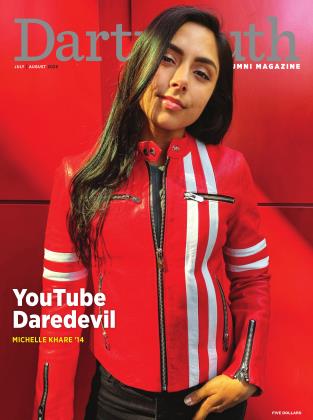The Meaning of Jazz
notebook
CAMPUS
ASK THE EXPERT
VAUGHN A. BOOKER ’07, ADV'16 ASSISTANT PROFESSOR OF RELIGION AND AFRICAN AND AFRICAN AMERICAN STUDIES
“Studying jazz musicians reveals complex individual and communal religious identities, expressions, and practices,” says Booker, author of the new Lift Every Voice and Swing: Black Musicians and Religious Culture in the Jazz Century (NYU Press). These “swing virtuosos” represented black lives in syncopation: “At times, they accented what religious and cultural conventions emphasized,” says Booker. “At other times, they accented what these conventions downplayed.” Here are four noteworthy musicians and their music that Booker recommends.
CAB CALLOWAY
(vocalist, dancer, composer, bandleader)
“Raised in a black Protestant religious household, Calloway attempted to convey through music and prose the humor he found with religiosity without denouncing religious persons or institutions. Nevertheless, the music Calloway performed and recorded reflected his decision to withdraw from regular participation in the institutional life of black Protestantism. His music resonated with many other African Americans who preferred Saturday leisure to Sunday service.” Listen to “Harlem Camp Meeting” (1933)
ELLA FITZGERALD A
(vocalist, composer, bandleader)
“Fitzgerald’s career in the late 1930s, 1940s, and 1950s became an effective vehicle for the desegregation of performance venues and the creation of integrated clubs due to her popularity with black and white audiences. Fitzgerald’s race representation included her status as a wealthy African American woman who provided for her extended family and who made charitable investments in civil rights organizations, particularly Martin Luther King Jr.’s Southern Christian Leadership Conference.”
Listen to “It’s Up to Me and You” (1968)
DUKE ELLINGTON
(pianist, composer, bandleader)
“When composing sacred jazz, Ellington’s private lyrical writings expressed belief in God, his frustrations with language to refer to God, and his appeal to the very act of believing. Ellington’s ultimate aspiration was to use music to express wordlessly the proper reverence for God. He wrote lyrics to convey his frustrations that language was inadequate for articulating what it meant to believe in and to speak of God. ‘God is beyond gender,’ Ellington declared.”
Listen to Third Sacred Concert, The Majesty of God, as Performed in Westminster Abbey (1975)
MARY LOU WILLIAMS
(pianist, composer, bandleader)
“In addition to performing and composing music, Williams worked tirelessly to manage her Bel Canto thrift shop, account for her finances, and aspire to realize a support system for musicians in need. With this work, she strove to forge a new sense of community between jazz artists and broader societies. A Roman Catholic convert, Williams’ daily labor comes to light as the outworking of her conception of a divine call—during the period that she and her Catholic friends contested the specific nature of this call.”
Listen to Black Christ of the Andes (1964)
CALL TO LEAD
80
Number of women who have donated at least $1 million to the current campaign
CLASS OF 2020
“I like to say that I crashed into college and I crashed out. My first term was the 2016 presidential election, and my last term was the coronavirus pandemic.”
Mary Versa Clemens-Sewall ’20
EUREKA!
[NEW FINDINGS AND RESEARCH]
Covid Llamas
Animals submit to testing.
Llamas may help unlock treatment for the virus that causes Covid-19. Camelids, including llamas, alpacas, and camels, produce a class of antibodies called nanobodies that are tiny enough to wedge themselves into crevices that bigger antibodies can’t reach, says Daniel Wrapp, a Ph.D. candidate in biochemistry at the Geisel School of Medicine. In 2016, with colleagues from the University of Texas at Austin and Ghent University in Belgium, a team including Wrapp vaccinated a 4-year-old llama named Winter with coronavirus spike proteins from viruses that caused the MERS and SARS outbreaks. Winter is just fine, Wrapp reports in Cell, and now those antibodies can be produced in a lab to develop therapies for Covid-19.
Charlotte Albright
Move Away, Vote More
Neighbors may influence polling.
Moving children out of lowincome neighborhoods raises the probability that they will become adult voters. That’s the finding of a study by researchers including Eric Chyn, a Dartmouth econ prof, published in a paper for the National Bureau of Economic Research. Their study focused on 3,000 households with nearly 6,000 children displaced by housing demolitions in Chicago from 1995 to 2000. After relocating to better areas, those kids grew up and were 13 to 16 percent more likely to vote than their peers in more impoverished areas. “Our study is one of the first to provide evidence that moving to a higher-opportunity neighborhood as a child may affect one’s political behavior as an adult,” says Chyn.
—C.A
 View Full Issue
View Full Issue
More From This Issue
-
 Cover Story
Cover StoryInternet Famous
JULY | AUGUST 2020 By Jennifer Wulff ’96 -
 Interview
Interview“A Failure to Dig Deeper”
JULY | AUGUST 2020 By ABIGAIL JONES ’03 -
 notebook
notebookOne for All, All for One
JULY | AUGUST 2020 By DENIS O’NEILL ’70 -
 notebook
notebookMy Arrest
JULY | AUGUST 2020 By KEITH BOYKIN ’87 -
 notebook
notebookFlex Time
JULY | AUGUST 2020 By ABIGAIL JONES ’03 -
 CLASS NOTES
CLASS NOTESDeaths
JULY | AUGUST 2020
Charlotte Albright
Notebook
-
 notebook
notebookMoving On
SEPTEMBER | OCTOBER 2018 -
 notebook
notebookCampus Confidential
JULY | AUGUST 2020 -
 notebook
notebookTransformative
MAY | JUNE 2023 -
 notebook
notebookA World of Trouble
MARCH | APRIL 2020 By DANIEL BENJAMIN -
 notebook
notebookLOOK WHO’S TALKING
MARCH | APRIL 2018 By James Napoli -
 notebook
notebookLOOK WHO'S TALKING
MAY | JUNE 2018 By James Napoli



